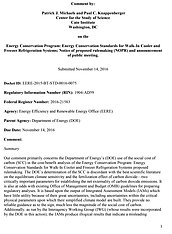Our comment primarily concerns the Department of Energy’s (DOE) use of the social cost of carbon (SCC) in the cost/benefit analysis of the Energy Conservation Program: Energy Conservation Standards for Walk-In Cooler and Freezer Refrigeration Systems proposed rulemaking. The DOE’s determination of the SCC is discordant with the best scientific literature on the equilibrium climate sensitivity and the fertilization effect of carbon dioxide—two critically important parameters for establishing the net externality of carbon dioxide emissions. It is also at odds with existing Office of Management and Budget (OMB) guidelines for preparing regulatory analyses. It is based upon the output of Integrated Assessment Models (IAMs) which have little utility because of their great uncertainties, including uncertainties within the critical physical parameters upon which their simplified climate model are built. They provide no reliable guidance as to the sign, much less the magnitude of the social cost of carbon. Additionally, as run by the Interagency Working Group (IWG) (whose results were incorporated by the DOE in this action), the IAMs produce illogical results that indicate a misleading disconnection between climate changes and the SCC value. Further, we show that the sea level rise projections (and thus SCC) of at least one of the IAMs (DICE 2010) is not supported by the mainstream climate science.
Until this entire situation can be properly rectified, the SCC should be barred from use in this and all other federal rulemaking. It is better not to include any value for the SCC in cost/benefit analyses such as these, than to include a value which is knowingly improper, inaccurate and misleading.

This work is licensed under a Creative Commons Attribution-NonCommercial-ShareAlike 4.0 International License.


